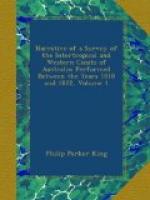“These Indians made repeated signs for hatchets, which they called paaco-paaco, and although they had stolen two or three on their first appearance, it was considered desirable to gain their goodwill by giving them more, and three were accordingly presented to individuals among them who appeared to be in authority. They were of course much pleased, but the next day several axes, knives, and sickles were taken by force from men employed outside the settlement, upon which they were made to understand that until these articles were restored no more would be given. This arrangement being persevered in by us, they determined upon seizing these implements on every occasion that presented itself; so that it was found necessary to protect our working parties in the woods by a guard; the result of which was that the natives threw their spears whenever resistance was offered, and the guard was obliged to fire upon the aggressors.
“Open acts of hostility having now been committed, and the natives increasing daily in numbers to upwards of one hundred round the settlement, a good lookout was kept upon them; but not sufficiently to prevent about sixty of them surprising five of the marines in a swamp cutting rushes, and throwing their spears amongst them: their salute was immediately returned, and they disappeared without any damage having been done on either side; at the same minute however reports of musketry were heard at our watering-place and garden and proved to be in repelling an attack that about forty natives had made upon our jolly-boat watering and two men cutting grass. One of the natives was shot dead at ten yards’ distance while in the act of throwing his spear; and our people thought that several others were wounded as they disappeared making most strange noises, and have not been near us since. One of the spears thrown upon the last occasion had sixteen barbs to it but, in general, they were merely scraped to a sharp point without even one barb, and were not thrown with anything like precision or good aim, which accounts for none of their weapons having taken effect, although discharged at our people at the distance only of a few yards.”
Soon after this the Tamar left Fort Dundas for the India station and despatched the Countess of Harcourt upon her ulterior destination. The settlement was left in a very forward state and consisted altogether of one hundred and twenty-six individuals of whom there were 3 or 4 women and forty-five convicts; the remainder were composed of detachments of the 3rd regiment (the Buffs) and of the marines, the latter under the command of Lieutenant Williamson. The Lady Nelson was left with Commandant Barlow.
Such is the state of the settlement of Fort Dundas, which at some future time must become a place of considerable consequence in the eastern world. The soil and climate of Melville and Bathurst Islands are capable of growing all the valuable productions of the East, particularly spices, and many other equally important articles of trade: it is conveniently placed for the protection of ships passing to our Indian possessions from Port Jackson, and admirably situated for the purposes of mercantile speculation.




